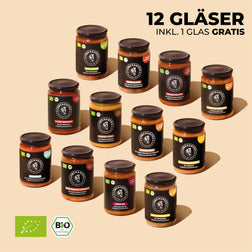Nutrient undersupply: Not only vegans are affected
A vegan diet seems predestined to be associated with nutrient deficiencies. However, very few people know that nutrition alone cannot be the decisive factor for undersupply.
In this article, we explain what other reasons there are for undersupply and why omnivores should also pay attention to their nutrient status.
CONTENTS
What are critical nutrients?
Critical nutrients are those nutrients that can lead to a potential deficiency of a particular nutrient in the body. Depending on the type of nutrient and the severity of the deficiency, this can even be life-threatening, e.g. vitamin B12.
Reasons for nutrient deficiency
Nobody is excluded from the development of a nutrient deficiency - no matter what diet is pursued. It is often argued that “all” vegan/vegetarian diets have deficiencies and that this can only be counteracted with an omnivorous diet. However, it is nonsense to say that "only" people are affected who eat no meat.
At the other end of the line of argument are research results that state exactly the opposite: meat eaters showed more deficiencies than vegans and vegetarians.
Both sides certainly have a claim to truth, but no study/examination result and no argument is generally valid. The fact is that everyone can develop a deficiency and there are vegans/vegetarians who have a better nutrient status than omnivores and vegans/vegetarians who are less well supplied.
The reasons for the formation of a deficiency are different:
Increased nutrient requirements in risk groups
Underlying diseases – both psychological and physical
Increased elimination of nutrients, eg through sweating or vomiting
Poor availability of nutrients from food, e.g. poor soil quality
-
Diet: Under-/deficient or little varied diet
Unhealthy Lifestyle
1. Increased nutrient requirements in risk groups
An increased need for nutrients is particularly present in so-called risk groups. Risk groups include people who have a predisposition to developing deficiency states, e.g.:
Elderly and/or physically handicapped people in need of care
Tumor/cancer patients
Chronically ill people, e.g. lung diseases, celiac disease, overactive/underactive thyroid, ...
-
Mentally ill people, eg depression, eating disorders, alcoholism, ..., as well as lonely, isolated people
pregnant women
athletes
People who take medication for a long time
Socially/socio-economically disadvantaged

2. Diseases can promote a state of deficiency
There are some diseases that favor a state of deficiency. These are primarily chronic diseases such as tumors, diseases of the gastrointestinal tract or mental illnesses.
Either the deficiency is caused by an inhibited absorption of nutrients in the body (e.g. celiac disease), by the increased daily requirement due to the disease, which cannot be adequately covered through food (e.g. vitamin D in the case of depression) or the deficiency is due to allergies/intolerances .
3. Increased elimination of nutrients
In particular, athletes and people with colds/ill people are affected by a high sweat secretion and are therefore more susceptible to deficiencies. However, healthy people are not exempt from this: In summer, increased sweating can lead to a higher loss of nutrients.
The main nutrients that are excreted through sweat and that have to be supplemented if there is a high loss of sweat are the electrolytes magnesium, potassium, calcium and sodium. Depending on the level of physical stress, especially athletes, there is a loss of zinc and iodine.
For the sake of completeness, it should be mentioned here that women excrete more iron during their period. Depending on the severity of the period, this can manifest itself in the form of tiredness, weakness, paleness and cold hands and feet.
4. Poor availability from food or low nutrient content in arable soil
There are nutrients that are present in sufficient quantities in food but are difficult for the body to absorb from certain foods, eg iron. Iron of plant origin (Fe3+) must first be converted to active Fe2+ in the body for it to be effective.
All of our dishes contain iron-rich foods. Women can cover over 70% of their daily iron requirement with a glass of African Bowl and mountain lentil stew , or with a glass of lentils à la Provence 81%. Men with the just mentioned even the whole!
Another problem affecting the adequate meeting of needs is the declining nutrient content in food . This affects various types of fruit and vegetables as well as cereals - no matter from which country. The reasons for this are nutrient-poor soils in deficient areas (e.g. iodine), depleted soils due to constant cultivation, the use of pesticides and fertilizers, unfavorable conditions during transport (e.g. long transport routes, insufficient cooling) or storage.
Climate change also affects the concentration of nutrients in food. The higher the carbon dioxide content in the air, the lower the amount of nutrients in fruits, vegetables and grains.
5. Nutrition
Of course, a deficiency can also be diet-related. Inadequate coverage of needs is in most cases due to carelessness and ignorance and is not due to a specific diet. Prejudice or not, vegans are just as affected as omnivores.
It is not only an unbalanced diet that leads to undersupply, but also calorie-related undernutrition during a diet, in the case of an eating disorder or when food is scarce (e.g. poor regions).
6. Unhealthy lifestyle
Last but not least, smoking, alcohol and too much stress also promote a nutrient deficiency. Smokers tend to have vitamin B and C deficiencies; Alcoholics with all vitamins as well as magnesium, potassium, zinc and selenium. Stressed people often suffer from vitamin B (especially B12), C and E as well as magnesium, zinc and iron deficiencies.
It is therefore not possible to say in general who is predestined for which deficiency states, since these are multifactorial - as you have already read. It makes a difference if you're an unsportsmanlike vegan or an athletic pescetarian on critical nutrients.
How do you recognize a nutrient deficiency?
Depending on the severity of the deficiency, you can recognize depleted memory better/worse. With a marginal nutrient deficiency , the body's functionality and performance is limited, which can manifest itself in general weakness/tiredness, paleness, headaches, concentration difficulties, increased susceptibility to infections, nervousness, brittle fingernails, dry skin/torn corners of the mouth, etc. By supplying the missing nutrients, the symptoms sometimes disappear after minutes.
In the case of an absolute nutrient deficiency , essential bodily functions cannot work properly. The symptoms just mentioned occur (usually more intense and over a longer period of time) as well as typical deficiency symptoms such as severe cramps, hair loss, pain, etc. The blood count should then be checked at the latest.
In general, the blood count should be checked regularly . On the one hand, a deficiency can go unnoticed and on the other hand, some nutrients (under medical supervision and depending on the individual) should be taken prophylactically anyway.
This is how you protect yourself from a nutrient deficiency
Eat a balanced diet based on the “eat the rainbow” principle
-
Find out about nutrition in general potentially critical nutrients in your diet: In this article we have listed the ten potentially critical nutrients in a vegan diet and explained how you can meet your needs without supplements.
Have your blood count checked regularly
Favor fortified foods and beverages, e.g. mineral water, fortified plant-based drinks, tofu, etc.
Eat little (highly) processed and high-fat food, but lots of fresh and home-cooked food
Only heat fruit and vegetables for as long as necessary to avoid inactivating the nutrients they contain
Watch your sweat loss
-
Go into the sun every day, also and especially in winter
This article was written by our author Lisa. Her greatest passions are nutrition/health, cooking and sport.





